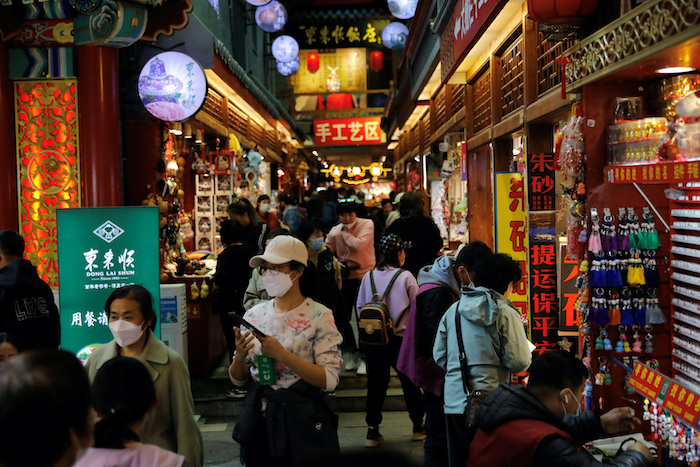China will extend its visa-free entry policy till the end of 2026 for 45 countries, mostly in Europe, but also some of its neighbours in Asia, plus others in South America and the Middle East.
It will also expand its tourism scheme to cover Sweden from next week, starting November 10, the foreign ministry said on Monday.
The extension covers 32 European countries as well as Australia, New Zealand, Japan, South Korea and several nations in South America and the Gulf region, a statement released by the foreign ministry’s consular affairs department showed.
ALSO SEE: US Supreme Court May Delay, But Likely Not Stop Trump’s Tariffs
The policy was scheduled to expire at the end of this year for many of the countries.
China has offered visa-free entry to citizens from dozens of countries in recent years as part of efforts to woo foreign visitors, and to revive a tourism sector battered by years of strict Covid-19 controls and boost foreign engagement at a time when it is struggling with high US tariffs.
The United States, Canada and Britain are not part of the scheme.
Under the scheme, visitors from eligible countries can enter China for business, tourism, family visits, or transit for up to 30 days without a visa.
China is also expanding its outreach to the European Union, a key trading partner, at a time of fraught trade ties.
Beijing confirmed that its one-year suspension of expanded rare earth export controls, announced after a meeting between President Xi Jinping and US President Donald Trump in South Korea last week, will also apply to the EU, the bloc said after officials met in Brussels last week to alleviate tensions.
The two sides agreed to continue communication and exchanges to promote the stability and smooth operation of China-EU industrial and supply chains, Beijing’s commerce ministry said on Monday.
Push to boost investment, trade with Russia
China’s President Xi Jinping on Tuesday also sought to expand mutual investment with Russia and affirmed Beijing’s commitment to advance ties despite “turbulent” external conditions, Chinese state media reported.
Xi met Russian Prime Minister Mikhail Mishustin in Beijing at the Great Hall of the People, a day after Chinese Premier Li Qiang held a meeting with Mishustin in Hangzhou, where Li said China wanted to strengthen cooperation with Russia and defend shared security interests.
The Kremlin has highlighted the significance of Mishustin’s visit at a time when Russia is under major Western sanctions over its war in Ukraine and looking to stem a recent slowdown in trade with China.
“China-Russia relations have stayed the course toward higher-level and higher-quality development, advancing steadily despite a turbulent external environment,” Xi told Mishustin, according to state broadcaster CCTV.
“Safeguarding, consolidating and developing China-Russia relations is a strategic choice for both sides,” Xi said.
He highlighted industries such as energy, agriculture, aerospace, digital economy and green development where the two countries could advance cooperation and foster new engines of growth.
Mishustin said it was important for both sides to continue creating favourable conditions for attracting mutual investment and supporting joint projects, according to Russia’s TASS news agency.
Xi and Russian President Vladimir Putin signed a “no-limits” partnership in February 2022 days before Putin sent tens of thousands of troops into Ukraine.
Since then, Russia has turned to China to blunt the impact of sanctions, highlighting record trade, increased settlements in yuan and deepening energy cooperation.
Bilateral commerce has, however, declined in recent months as China faces mounting US pressure over trade and technology.
Chinese state oil majors suspended purchases of seaborne Russian oil following US sanctions on Rosneft and Lukoil, Moscow’s two biggest oil companies, Reuters reported last month.
In a joint communique published on the Russian government website on Tuesday, both countries agreed to “strengthen cooperation in all spheres and respond appropriately to external challenges.”
Russia also reaffirmed its adherence to the “one-China” principle and opposition to “Taiwan independence”.
China regards democratically-ruled Taiwan as part of its territory. Taiwan’s government rejects Beijing’s claim and says only the island’s people can decide their future.
- Reuters with additional editing by Jim Pollard
ALSO SEE:
Chinese Manufacturing Slumps to Six-Month Low, as Exports Fall
Trump Cuts US Tariffs to 47%, Xi Vows to Ease Rare Earth Curbs
China’s EV Subsidy Era May End As Exports Boom, Priorities Shift
China Party Chiefs Vow to Boost Innovation, Oh, And Consumption
Foreign Firms Struggling Amid China’s Economic Slump, Trade War
Putin Seen Seeking More Help From Xi to Curb Russian Trade Fall
China Expands Visa-Free Entry to Nine More Countries – AP
China Visitor Numbers Double After Visa Rules Lifted – SCMP
























